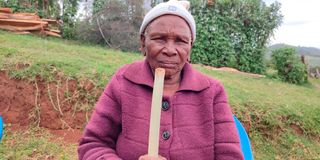Indigenous People's Day: Landless Ogiek granny speaks of struggles

Naiswaku Enole, an 85-year-old Ogiek woman, at her son's home in Nkaroni, Narok County, on July 28, 2023.
What you need to know:
- Today is International Day of the World's Indigenous Peoples.
- The day is set aside by the United Nations to protect and raise awareness of the rights of the world's indigenous population.
Today is International Day of the World's Indigenous Peoples, a day set aside by the United Nations (UN) to protect and raise awareness of the rights of the world's indigenous population.
According to the UN, indigenous women face multiple challenges due to their gender and ethnicity, thus increasing their vulnerability to poverty and chronic malnutrition.
I speak with Naiswaku Enole, an 85-year-old Ogiek woman, on what it's like to be an indigenous woman in this era. She shares her story:
“I was born, raised, and married in Sogoo, Narok County. This is one of the areas where the Ogiek lived for centuries. My mother and father were born here too.
“When I was young, we used to eat wild meat and fruits. That was our lifestyle. We didn’t know anything about farming.
“But years later, we saw people settle in the forest and start farming. The animals became fewer and so we had to adapt. We also started farming maize and Irish potatoes.
“In the 1970s, Ogiek formed group ranches and my husband joined Sogoo group ranch in Maasai Mau. He was allocated more than 20 acres. He later died. I can’t remember the year, but it must have been more than 10 years ago. I inherited the land. I continued to farm.
“I also had so many cows, goats and sheep. Then in 2019, the government evicted us. I lost everything. All my eight children were dispersed. I loved being close to my children. They live miles away from each other across Sogoo and Nkaroni (Narok County). Some moved to Marishooni (Nakuru County). My five sons had to sell their livestock to buy plots.
“Now I have become their frequent visitor; a nomad looking for shelter and food. I've become a beggar, loitering around my children's homes.
“Today, I’m at one of my sons' in Nkaroni. I’ve been here since May and I feel like a prisoner. I want a place where I'd go to farm or milk cows. Here, there is nothing. I’m bored.
“I’m now thinking of visiting my other son in Sogoo. I’ll start my journey at 6am, and trek slowly up to his home. That’s my life now, moving from one child to another, throughout the year.
“Never did I ever imagine that one day I’d be a homeless grandmother stressing my children and grandchildren over my shelter and food.

Naiswaku Enole, an 85-year-old Ogiek woman, at her son's home in Nkaroni, Narok County, on July 28, 2023.
“I’d be looking after my cows if I had my own land. I’d have enough money to cover my medical expenses.
“My son now lives on a quarter acre; I can’t expect him to build me a house. If he does, where will he put the latrine? Where will I grow my vegetables? What about his family, where will they grow theirs?
“How will my grandchildren go to school if their parents have no means of raising an income? All I want is my land back. I was born here, where am I supposed to go?”
The son that Naiswaku says lives on a quarter acre is Julius Sulunye, her current host.
Julius says: “Recently, she hurt her left leg while trekking to my brother who lives about 10 kilometres away. We had to fundraise to take her to the hospital.”
“She feels guilty living in our homes. If she visits and feels like she’s not well treated, she will leave after two days.”
The Ogiek are a hunter-gatherer community recognised in Kenya under Article 260 of the Constitution, which defines marginalised communities as those that retain and maintain a traditional lifestyle and livelihood based on a hunter or gatherer economy.
Due to eviction, this lifestyle has been disrupted and they had to adapt to a new way of life.
Sogoo chief Nelson Kobei, whose jurisdiction covers Nkaroni, says: “In 1998, the group ranches were dissolved to pave the way for individual titling. In 2005, the government sent surveyors to establish the forest boundaries.
"The boundaries split our land. Some were found to be in the forest like mine in Sogoo ranch and others outside the boundaries.”
The ones whose land was found to be beyond the boundaries like Naiswaku’s were then evicted.





